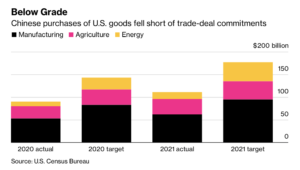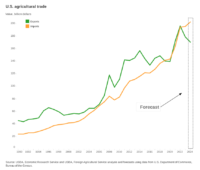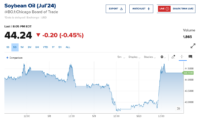Bloomberg's Clarice Couto reported this past Friday that "a surprising tax change in agriculture powerhouse Brazil has the potential to make soy grown in the world’s largest bean exporter less…
On Phase One, U.S. Patience with China “Wearing Thin,” as Purchase Commitments Fell Short
Reuters writers Andrea Shalal and David Lawder reported this week that, “U.S. officials called on Monday for ‘concrete action‘ from China to make good on its commitment to purchase $200 billion in additional U.S. goods and services in 2020 and 2021 under the ‘Phase 1’ trade deal signed by former President Donald Trump.
“The officials said Washington was losing patience with Beijing, which had ‘not shown real signs‘ in recent months that it would close the gap in the two-year purchase commitments that expired at the end of 2021.”
Shalal and Lawder explained that, “Through November, China had met only about 60% of the goal, according to trade data compiled by Peterson Institute for International Economics senior fellow Chad Bown.”
The Reuters article stated that, “U.S. President Joe Biden has said the trade deal did not address the core problems with China’s state-led economy, but U.S. officials have pressed Beijing to make good on the deal as signed.
‘Because we inherited this deal, we engaged the (People’s Republic of China) on its purchase commitment shortfalls, both to fight for U.S. farmers, ranchers and manufacturers and give China the opportunity to follow through on its commitments. But our patience is wearing thin,’ said one of the officials.
“China continued to engage with U.S. officials on the issue, but Washington was seeking ‘concrete action,’ not ‘talks for the sake of talking,’ the official added.”
Bloomberg writers Jenny Leonard and Eric Martin reported this week that, “Chinese Foreign Ministry spokesman Zhao Lijian described the two nations’ trade relationship as ‘mutually beneficial‘ during a regular press briefing on Monday in Beijing.”

A Reuters News article on Tuesday provided an update to the Phase One trade numbers reflecting the latest data from December.
The article stated that, “U.S. goods exports to China fell in December, cementing a massive shortfall in Beijing’s two-year purchase commitments under the ‘Phase 1’ trade deal negotiated by former President Donald Trump’s administration.”
“An analysis of final 2021 Census trade data compiled by economist Chad Bown of the Peterson Institute for International Economics showed China met just 57% of its full two-year goods and services targets,” the article said.
Recall that in October, the Biden administration begin defining its China trade policy, and U.S. Trade Representative Katherine Tai met virtually with Chinese Vice Premier Liu He as the executive branch kicked off its trade-policy engagement with China.
President Biden and Chinese President Xi Jinping held a virtual summit in November; however, Washington Post writers Seung Min Kim, Ashley Parker, Ellen Nakashima and Lily Kuo reported at the time that, “Trade was raised, and Biden emphasized the need for China to uphold its commitments to buy additional goods from the United States, but it was not a ‘dominant part’ of the conversation, the official said.”
New York Times writer Ana Swanson reported on Tuesday that, “The Biden administration has been carrying out negotiations with Chinese officials about the trade deal and said that it intends to hold China to its commitments. But it has not yet clarified what action it will take in response.”
In a separate issue regarding China and agricultural trade, Reuters News reported this week that, “China and Argentina pledged on Sunday to deepen strategic cooperation on trade, currency and the infrastructure-focused Belt and Road Initiative, the government and state media said after a meeting of presidents Xi Jinping and Alberto Fernandez.
“The leaders, who met on the sidelines of the Beijing 2022 Winter Olympics, agreed on a five-year plan for agricultural cooperation and identified key areas to grow and diversify trade and investment in the sector.
“China is a major buyer of Argentine soybeans and beef. It also has a major currency swap deal with the country, which helps to bolster its dwindling foreign reserves. Fernandez is battling to revive the economy of Argentina, a major grains producer.”







